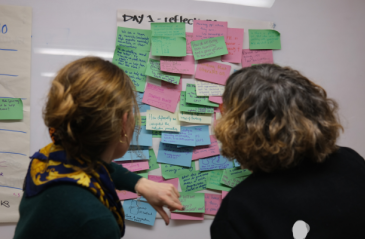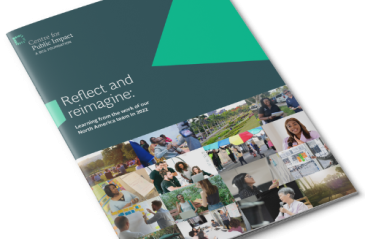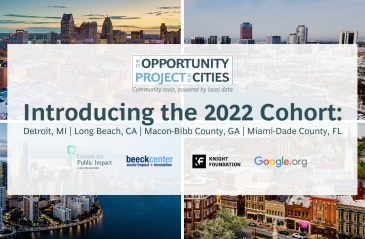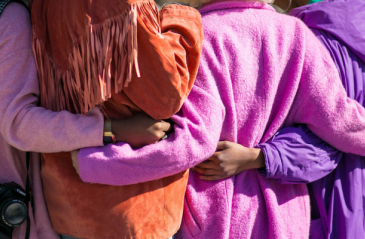
Five things we recently learned about government failure

Jawun is an Australian not-for-profit transferring skilled people into Indigenous organisations
Share articleKaryn Baylis: If you lack the capacity and capability to do so, then you fail
Share articleKaryn Baylis: Many Indigenous organisations remain without strong governance systems
Share articleWe put our vision for government into practice through learning partner projects that align with our values and help reimagine government so that it works for everyone.
In January 2016 Cape York Partnership, an Indigenous policy reform and leadership organisation in Far North Queensland, launched the Cape York Girl Academy, an independent boarding school for Indigenous mothers aged 13-17. The first of its kind in Australia, the Girl Academy provides education, accommodation and opportunity for young Indigenous women who have been disengaged from education, training and employment, and it accommodates their babies too.
Playing a key role in its successful launch was Dean Pagonis, a secondee from The Boston Consulting Group, who was placed there by Jawun, an innovative not-for-profit that transfers skilled people from Australia's leading companies and government agencies into Indigenous organisations.
For its chief executive, Karyn Baylis, this success was just the latest from a conveyor belt of projects large and small, all of which have been designed to deliver much-needed and sustainable improvements for Australia's Indigenous people. “Ours is a partnership model which emphasises working with Indigenous people, rather than simply providing services to them,” she explains.
Established in 2001, Jawun (which means “friend” in the Kuku Yalanji language of Mossman Gorge) works across remote, regional and urban Australia. It was set up in response to the remaining challenges facing the country's Indigenous people. Although they have access to universal healthcare, education and welfare, average life expectancy for Indigenous Australians is well below non-Indigenous Australians, and in some communities unemployment is as high as 80%.
It was against this challenging backdrop that a conference took place in Weipa, Far North Queensland. “The then Queensland premier, Peter Beattie, hosted this event and he brought a lot of people together - Indigenous, corporate, government - to have a broad discussion about the potential for Indigenous businesses,” recalls Baylis.
“During these discussions, the Aboriginal academic and lawyer, Noel Pearson, had a conversation with Ann Sherry, a senior executive at Westpac, Australia's oldest bank, and Colin Carter, a founder of The Boston Consulting Group in Australia. Colin asked Noel how corporate Australia could help address the challenges Indigenous Australia faces and, rather than saying he needed its money, he said he needed its people. What they had were ideas but little commercial or business acumen. They didn't have the skills or knowledge to take these lofty ideas and turn them into effective execution and activities.” It was from this initial conversation that Jawun was born.
The approach also stemmed from the recognition that previous reform attempts had failed to deliver sustainable improvements for Indigenous communities. “Looking at this through a Jawun lens, there is this challenge stemming from Indigenous people being provided with welfare for the first time,” says Baylis. “Through welfare, you lose a bit of impetus to have your own self-determination. This was combined, from the early 1990s onwards, with alcohol being introduced into their communities - which many people weren't used to and which had some terrible effects.”
She goes on to say that the repercussions of this unfortunate mix continue to linger today. ”That said, this generation has a major focus on self-determination, ensuring kids are in school, communities are safe and adults have a job. Our challenge is to enable this at every level of society.”
The Jawun model focuses instead on Indigenous-led initiatives that resonate strongly with local communities. They also partner across different sectors and deploy programmes that utilise the skill sets of the secondees - who now hail from a wide range of Australia's top private sector organisations - in a far more cost-effective way than previous approaches.
“Jawun is now a broker, an enabler and an influencer between corporate Australia and Indigenous Australia, and indeed now the government as well - both state and commonwealth,” adds Baylis, who can call upon insights gained from her career in a range of senior management and C-suite executive roles in multinational businesses. “We connect the dots through various mechanisms, but the core of it is encouraging our partners to place people on secondments that ultimately lead to skills transfer and capability-building by working on tangible and practical pieces of work.”
The secondee model also enables Indigenous communities to harvest the eclectic skill sets of Australia's best and brightest, while at the same time benefiting from greater empowerment and self-determination. “We want people to be empowered and in control of their own lives, but if you lack the capacity and capability to do so, then you fail,” says Baylis. “And this is really at the heart of Jawun - to build sustainability in organisations, while empowering leaders so they can actually implement solutions and programmes that are effective.”
She is also keen to stress that the secondees can bring a change in mindset - it's a learning process, one that will leave a deep legacy of knowledge and insight. “It is OK to fail,” she says. “There are lots of ideas out there and some of them won't fly, but we want people to understand why they won't work and if they need to narrow the scope or whatever. Some Indigenous organisations may have grown, but they're doing so without strong accounting or governance systems. Thanks to the secondees, they're becoming more sophisticated and they're addressing the issues that will help them become more sustainable, attract people and also be more effective in what they're implementing.”
The impact of Jawun's programmes can be seen in different ways. There are the day-to-day efforts of the secondees, but also a less obvious benefit. The number of secondments over the 15 years of Jawun's existence now totals 2,000, and these individuals have gone on to climb the career ladder in both government and business. “There is no doubt that having all of these people - many of whom are now very influential - means we are shifting attitudes in mainstream Australia,” says Baylis. “And their approach and knowledge can trickle down from the top of their organisations to their teams and staff below them - further accelerating this process.”
Looking to the future, Baylis says that some changes are in the offing, including an expansion in the number of regions it operates in - from 9 to 12. “I think the model as it stands today could always be needed, but you have to get to a point where you question whether or not it has become corporate welfare,” she says. “And so we're looking at transitioning from some of the communities we've been in for a long time and moving on to others.”
The demand for Jawun's services remains acute - “if you talk to most Indigenous people they think that the cycle they are in of social and economic disadvantage has another 20 years to run” - but Baylis believes that she and her team will not be needed in perpetuity.
“For us, success will only be when we're not needed any more,” she concludes. “At the end of the day, that's the kind of impact we're all working towards.”









